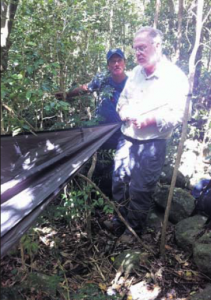The Daily Herald writes that conservation ecologist Adrian Delnevo visited Saba early March to conduct research with Saba Conservation Foundation (SCF) on the red-billed tropicbird and Audubon shearwater, also known as the wedrego, named after the sound it makes.
Delnevo is a regular visitor to Saba and St. Eustatius and has been an active conservation ecologist for over 40 years. Delnevo investigated a new area for nesting tropicbirds on the south side of Saba, and found direct evidence of nesting birds and a strong likelihood for nesting wedrego. He will also venture to the hillside below Zion’s Hill to see if he can find wedrego nests. There is hardly any knowledge of the breeding habits of the wedrego on Saba. If Delnevo can locate the nests, further studies can be conducted on their breeding ecology and potential threats, such as invasive predators like cats and rats. In addition to his work on seabird species, Delnevo started a pilot study of biodiversity and ecosystem monitoring and will assess the relationships between species and their habitat. This effort is very labour intensive, but is made easier by the use of various automatic recording devices that were deployed over several days and nights.
This pilot study started within the dry forest and included 24-hour infrared cameras, sound-recording equipment for birds, amphibians and bats (by using ultrasonic microphones) and some insects, as well as other non-lethal trapping techniques. Multiple, simultaneous data recorded will be combined with weather data into a large database for subsequent analysis. The analysis will include the use of statistical artificial intelligence software. Having found patterns, trends and relationships, this software can then be “trained” to recognise species, and in some cases even recognise individual animals. This type of information may then be used to estimate population sizes, how often the site is used, and many other biological and ecological data. Overall, this information may form the basis for further monitoring, and whether species and their habitats are changing over time.
Previous studies within habitats or ecosystems have tended to look at individual species. However, this may be one of the first studies to incorporate a broad range of information and analyze it using artificial neural networks. Consequently, this pilot study may lead to a more comprehensive and statistically validated assessment of ecosystem relationships. Park ranger for St. Eustatius National Parks Stenapa Hannah Madden assisted Delnevo in these studies. Thus, the knowledge gained on Saba may subsequently be applied on Statia and elsewhere. The study and exchange were made possible with support of Dutch Caribbean Nature Alliance and local support of Juliana’s Hotel, AES Inc. and SCF.
 Archive of posts from Saba-News.com Archive Saba News
Archive of posts from Saba-News.com Archive Saba News
